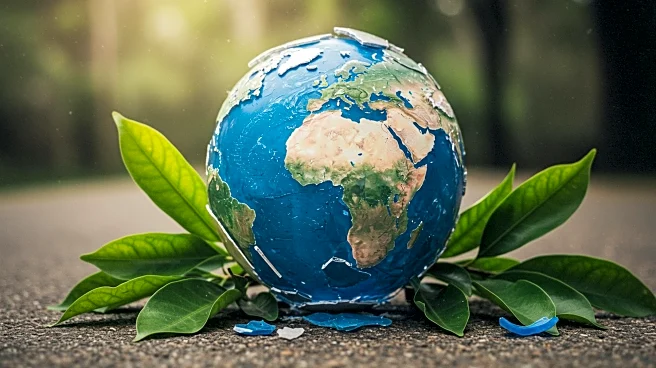What is the story about?
What's Happening?
Negotiations for a UN Global Plastics Treaty aimed at ending plastic pollution by 2040 have collapsed after three years of discussions. The latest round of talks in Geneva failed to produce a binding agreement, largely due to resistance from petrochemical-producing nations like Saudi Arabia, Russia, and Iran. These countries opposed more ambitious climate-critical measures, while other nations refused to accept a watered-down version of the treaty. The lack of a binding framework has left environmental advocates disappointed, as major plastic-producing countries prioritize petrochemical interests over environmental concerns. Despite the setback, over 100 nations remain committed to not compromising on the treaty's goals, suggesting alternative approaches such as additional negotiating rounds or forming a coalition of willing countries to move forward.
Why It's Important?
The failure to reach a binding agreement on the plastics treaty has significant implications for global environmental policy and the fight against plastic pollution. Without a formal treaty, countries may continue to prioritize economic interests over environmental protection, potentially exacerbating the $1.5 trillion in global health-related economic losses attributed to plastic pollution. Businesses, particularly those with international operations, may face uncertainty as they await concrete guidelines on plastic production and waste management. The pressure from investors and consumers for companies to address their plastic footprint is increasing, and the absence of a treaty could lead to strategic irresponsibility if businesses delay action. The situation underscores the need for companies to proactively implement circular solutions and reduce reliance on traditional plastics.
What's Next?
In the absence of a binding treaty, countries and businesses may explore alternative strategies to address plastic pollution. This could include forming coalitions of willing nations to advance the treaty's goals outside the existing framework. Businesses are encouraged to take independent action to reduce their plastic footprint, as waiting for multilateral alignment may result in competitive disadvantages. Innovations in bioplastics and circular solutions are expected to play a role in reducing plastic waste, but they are not seen as a complete solution. Companies may need to rethink their operations to embed sustainable practices and prepare for future regulatory changes. The global push towards a plastic-free world continues, with national regulatory changes and innovative solutions gaining momentum.
















